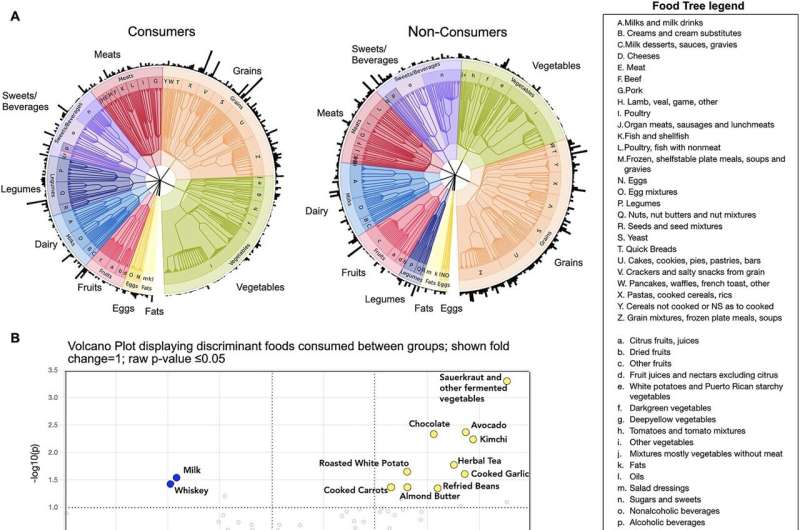This article has been reviewed according to Science X's editorial process and policies. Editors have highlighted the following attributes while ensuring the content's credibility:
fact-checked
trusted source
proofread
Fermented vegetables found to positively impact gut health

Fermented foods have grown in popularity and are widely consumed, in part due to claims regarding their positive effect on digestive health. However, these claims lack sufficient scientific support, especially for lacto-fermented vegetables.
A team of University of Minnesota researchers set out to test these claims, by studying if frequent consumption of lacto-fermented vegetables, such as kimchi or kraut, had any effect on the trillions of bacteria that make up the gut microbiome.
Their findings were recently published in the journal Gut Microbiome.
To conduct their study, the researchers collected fecal samples of 23 people in the Twin Cities who frequently consumed at least one serving of plant-based fermented foods, five times a week for two years. This did not include dairy ferments. Their fecal microbiomes were studied and compared to those of 24 people who never or rarely consumed lacto-fermented vegetables or other fermented foods, and had not done so in the last two years.
The researchers conducted a thorough dietary examination of the participants before beginning the experiment and found both consumers of lacto-fermented foods and non-consumers started from a similar place in terms of overall diet quality. They determined the Healthy Eating Index score, a USDA measure of nutritional health, and found both groups were close to the national average score for adults, which is 58 out of 100. Lacto-fermented vegetable consumers were slightly higher at 59 out of 100, and non-consumer had a slightly lower score of 55 out of 100.
The researchers found:
- Potentially probiotic bacteria and fungi likely derived from the lacto-fermented vegetables were found in the feces of some individuals regularly consuming fermented foods.
- Regular consumption of lacto-fermented vegetables may stimulate bacteria with the potential to produce butyrate, a compound in the gut that is widely known for its positive effects on health.
Lacto-fermented vegetables have a significantly greater effect on some of the functions performed by microorganisms in the gut and on the nutrients that our microbiome uses to perform functions with potentially key effects on health. This is demonstrated by the observation that regular consumers showed a greater diversity of fecal metabolites (small gut nutrients) and greater production of microbial nutrients with known positive effects on health such as acetate and propionate (short chain fatty acids).
"Our findings support existing research showing that fermented foods, in this case, lacto-fermented vegetables, benefit the gut microbiome and metabolome in people consuming a typical Western diet," said lead author Kylene Guse, a postdoctoral researcher at the University of South Dakota, formerly with the U of M.
However, these microbiome-mediated benefits should be tested by taking repeated snapshots of a person's microbiome over time, and assessing if consumption can improve specific health issues in humans.
"Our findings have implications for health prevention strategies based on the healing power of healthy foods," said Andres Gomez, an assistant professor in the Department of Animal Science. "In the future, we need to test a potential positive effect of consuming lacto-fermented vegetables in subjects with specific diseases with a known microbiome connection, such as cancer, obesity or autoimmune disease, among others."
The team is currently assessing how they can expand community health and science literacy on the potential benefits of consuming fermented vegetables and how the gut microbiome is an important component for health maintenance. They are also testing the effect of consuming other fermented foods—specifically kombucha—in addressing mental health issues, as associations emerge between gut microbes and brain function
More information: Kylene Guse et al, Regular consumption of lacto-fermented vegetables has greater effects on the gut metabolome compared with the microbiome, Gut Microbiome (2023). DOI: 10.1017/gmb.2023.9



















